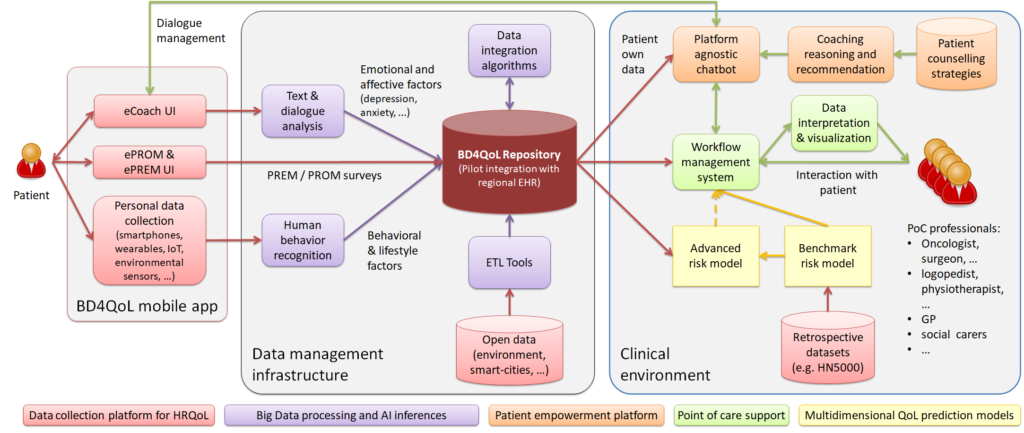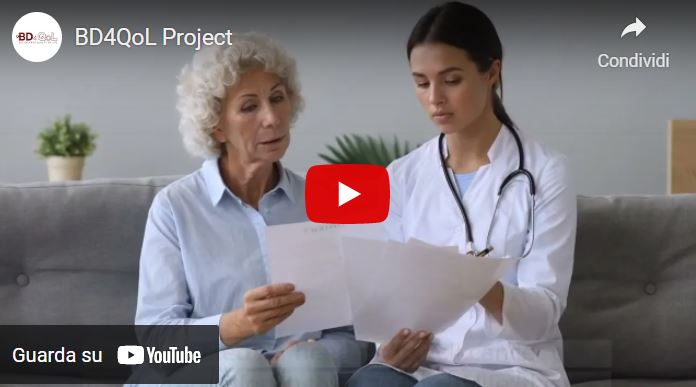Since January 1st 2020, MultiMed Engineers participates in the BD4QoL Project — Big Data Models and Intelligent tools for Quality of Life monitoring and participatory empowerment of head and neck cancer survivors.
A major complaint of cancer survivors is that they do not benefit from coordinated, proactive and personalized care management after treatment and from adequate access to supportive care options. This represents a particularly important unmet need for very complex tumors such as Head and Neck Cancer (HNC). HNC imposes an extremely high socioeconomic burden on patients compared to other tumors, including costs from treatment-induced morbidities, loss of workforce participation and short-term disability. Treatments such as surgery and/or chemo-radiotherapy have a detrimental effect on basic functions including speech, swallowing and nutrition, nerve palsy, fatigue, depression, self-confidence, and appearance. Risks of recurrence or development of new cancers are high. These factors can have a profound negative influence on emotional well-being, interpersonal relationships, loss of work, stigmatization, and social integration.
E-health applications for actionable monitoring of health-related quality of life (HRQOL), supported by risk prediction models, computerized decision support, and self-help interventions carry the promise to sustainably improve monitoring, supportive care and empowerment of cancer survivors.
BD4QoL objective is to improve HNC survivor’s Quality of Life through person-centred monitoring and follow-up planning by contribution of artificial intelligence and big data (multidisciplinary medical, environmental, personal feelings, socioeconomic and behavioral data) unobtrusively collected from commonly used mobile devices, in combination with multi-source clinical, -omic, socioeconomic data and patients reported outcomes, to profile HNC survivors for improving personalized monitoring and support. The analysis of newly detected QoL indicators will allow anticipating risks, inform patients and caregivers for personalized interventions to timely intercept and prevent long-term effects of treatment.

In order to achieve this objective, the project will implement a complex architecture, based a four-pronged rationale:
- Leverage the growing number of data collection technologies which are increasingly available in modern smart‑environments to gather “big data” assets on subjects’ conduct, which can be used to unobtrusively obtain rich longitudinal information about the long term effects of cancer treatment by application of automated inference, grounded on artificial intelligence methods. In particular, such inference refers to the recognition of behaviors, based on clustering and then labelling of raw data streams from sensors and orthogonal datasets, and the detection of emotional and psychological affects, based on interaction with an e-coach application
- Deployment of a workflow management system, aimed to deliver, interpret and present the information inferred as above described to the different stakeholders involved in patients’ follow up (e.g. oncologists, surgeons, GPs, caregivers, speech therapists, physiotherapists, etc.) at different Points of Care. This is expected to augment the knowledge available to health- and social-care professionals to support them making better decisions, for example by personalizing follow up plans, according to the specific HRQoL and health evolution of each single patient
- Deployment of an e-coach chatbot application to empower patients to manage their HRQoL and health, under the supervision of clinicians. The e-coach functions will include: (i) dialogue management based on contextual reasoning and reinforcement learning for the automated delivery of counselling strategies (established by clinicians) which increase patient motivation; (ii) management of two-ways communications with PoCs (e.g. for the patient to request specific support in case of special needs, or for clinicians to summon the patient for a visit in case of early detection of HRQoL or health issues); (iii) detection of affective traits embodied in the e-coach/patient dialogue, through sentiment analysis and emotion analysis technologies. The latter element can be used to both re-adapt the chatbot counselling strategy, along thereinforcement learning paradigm, as well as to provide additional information on subjects affects to clinicians, through the workflow management system illustrated in the previous bullet.
- Usage of multidimensional prediction models, trained with machine learning techniques on the basis of: (i) large retrospective datasets on HRQoL and health trajectories of HNC patients, provided by participating hospitals; and (ii) creation of a new prospective dataset, collected in the frame of a randomized clinical study, conducted within the project which, in addition to those variables, adds the novel behavioral and affective features previously mentioned. The objective of such models is to provide innovative ways to (i) stratify patients according to their specific risks of HRQoL and/or health deterioration; and (ii) provide early detection of possibly critical issues, which – depending on the severity – may require timely response from the patient herself or from the social- or health-care system.
Project outcomes will be tested and evaluated in realistic conditions, through a randomized controlled experiment involving around 400 HNC patients at three European hospitals (two in Italy and one in the UK).
The following video provides a brief overview on the Project.
The Project Consortium is coordinated by Università degli Studi di Milano (IT) and includes — in addition to MultiMed Engineers — the following Partners: Universitätsmedizin Mainz (DE), University of Deusto (ES), DOTSOFT (GR), Fondazione Casa Sollievo della Sofferenza (IT), Universidad Politécnica de Madrid (ES), University of Bristol (UK), IBM Ireland (IE), Inetum (ES), Regione Lombardia (IT), Azienda Sanitaria Locale TO3 (IT), Universitetet i Oslo (NO), Fondazione IRCCS Istituto Nazionale dei Tumori (IT), ARIA S.p.A. (IT).
MultiMed Engineers, which participated in the overall conception of the Project, is involved in the modelling of novel behavioural and affective traits features to be included in HRQoL assessment and prediction, in supporting the implementation of the related data collection platform, and in planning and conducting the Health Technology Assessment study that will investigate the cost-utility ratio of the BD4QoL solution, along the value based healthcare paradigm.

This project has received funding from the European Union’s Horizon 2020 research and innovation programme under grant agreement No 875192
 MultiMed Engineers
MultiMed Engineers